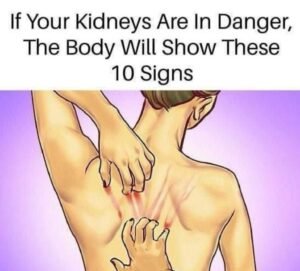10 Warning Signs of Kidney Disease You Should Never Ignore: Early Detection Tips

10 Warning Signs of Kidney Disease You Should Never Ignore: Tips for Early DetectionKidney disease is a serious condition that often goes unnoticed until it has reached an advanced stage. The kidneys are essential organs responsible for filtering waste from the blood and maintaining fluid balance in the body. Unfortunately, kidney disease can develop gradually, and many people don’t realize they have it until it becomes severe.Recognizing the early signs of kidney disease is crucial, as timely intervention can significantly improve the management of the condition. In this article, we will explore 10 warning signs that may indicate kidney problems and explain why early detection is vital.Why Early Detection of Kidney Disease MattersKidney disease often progresses silently, without noticeable symptoms, especially in its early stages. Identifying it early allows for effective management through lifestyle changes, medication, or in some cases, dialysis. The sooner kidney disease is detected, the more treatment options are available, helping you maintain a better quality of life.If you notice any of these 10 warning signs, it’s important to seek medical advice to prevent the disease from progressing into kidney failure or requiring more invasive treatments.
1. Frequent Urination, Especially at NightOne of the first symptoms of kidney disease is frequent urination, particularly during the night (known as nocturia). The kidneys filter waste and produce urine, and any issues with kidney function can lead to increased urination. If you find yourself waking up multiple times at night to use the bathroom, it could be a sign that your kidneys are struggling.
2. Swelling in the Feet, Ankles, or LegsSwelling in the lower limbs is another common symptom of kidney disease. When the kidneys are not functioning properly, they cannot filter excess sodium and fluid, leading to fluid retention. This can cause swelling in the feet, ankles, and legs. If your shoes or socks feel tighter than usual or your legs appear swollen, it could indicate kidney issues.
3. Persistent Fatigue and WeaknessFatigue is a common symptom of various health problems, but when the kidneys aren’t functioning properly, waste and toxins build up in the body, leading to low energy levels. If you’re constantly tired, even after adequate rest, this could be a sign that your kidneys are not filtering toxins effectively.
4. Blood in the Urine (Hematuria)Blood in the urine is a serious warning sign. Hematuria can indicate damage to the kidneys or urinary tract. It may be caused by kidney stones, infection, or more severe kidney disease. If you notice pink, red, or brown-colored urine, or see blood clots in your urine, seek medical attention immediately.
5. Foamy or Frothy UrineFoamy or frothy urine may be a sign of protein in the urine, known as proteinuria. When the kidneys are damaged, they lose their ability to filter proteins effectively, causing proteins like albumin to leak into the urine, resulting in a foamy appearance. If your urine looks unusually bubbly, this could indicate kidney damage.
6. Shortness of BreathShortness of breath can occur when kidney disease leads to fluid buildup in the lungs. While more common in advanced stages, it can also occur early on. If your kidneys can’t properly filter waste and excess fluid, it can accumulate in the lungs, making breathing difficult. If you experience shortness of breath, especially while resting, consult a doctor.
7. Nausea and VomitingNausea and vomiting are frequent symptoms of kidney disease. When the kidneys are unable to remove waste from the body, toxins accumulate, leading to nausea and vomiting. These symptoms may worsen as the disease progresses. If you experience persistent nausea or vomiting without a clear cause, it could be a sign that your kidneys are not functioning properly.
8. Poor Appetite and Unexplained Weight LossA loss of appetite and unexplained weight loss can be early indicators of kidney disease. As the kidneys become damaged, waste builds up in the body, leading to a reduced appetite. Additionally, the body may struggle to absorb nutrients, causing unintended weight loss. If you notice a sudden drop in appetite or unexplained weight loss, it’s important to seek medical attention.
9. Itchy Skin and DrynessItchy, dry skin can occur when kidney disease prevents the body from properly filtering toxins. As waste accumulates, it can cause skin issues like dryness and persistent itching, especially in later stages of kidney disease. If moisturizing doesn’t relieve the itch, or if you experience dryness that doesn’t improve, it may be a sign of kidney problems.
10. High Blood PressureHigh blood pressure is both a cause and a result of kidney disease. When the kidneys are damaged, they may struggle to regulate blood pressure, leading to hypertension. Conversely, high blood pressure can worsen kidney function, creating a harmful cycle. If your blood pressure is consistently high, even with treatment, it could be an indication of kidney issues.ConclusionRecognizing the warning signs of kidney disease is crucial for early intervention and preventing further complications. Symptoms such as swelling, changes in urination, fatigue, and unexplained weight loss should not be ignored. If you notice any of these signs, it’s important to consult with a healthcare provider for a proper diagnosis and treatment plan.Your kidneys are vital to your overall health, and paying attention to these symptoms can help you catch potential issues before they become severe. Early detection can make a big difference in preserving kidney function and improving quality of life.